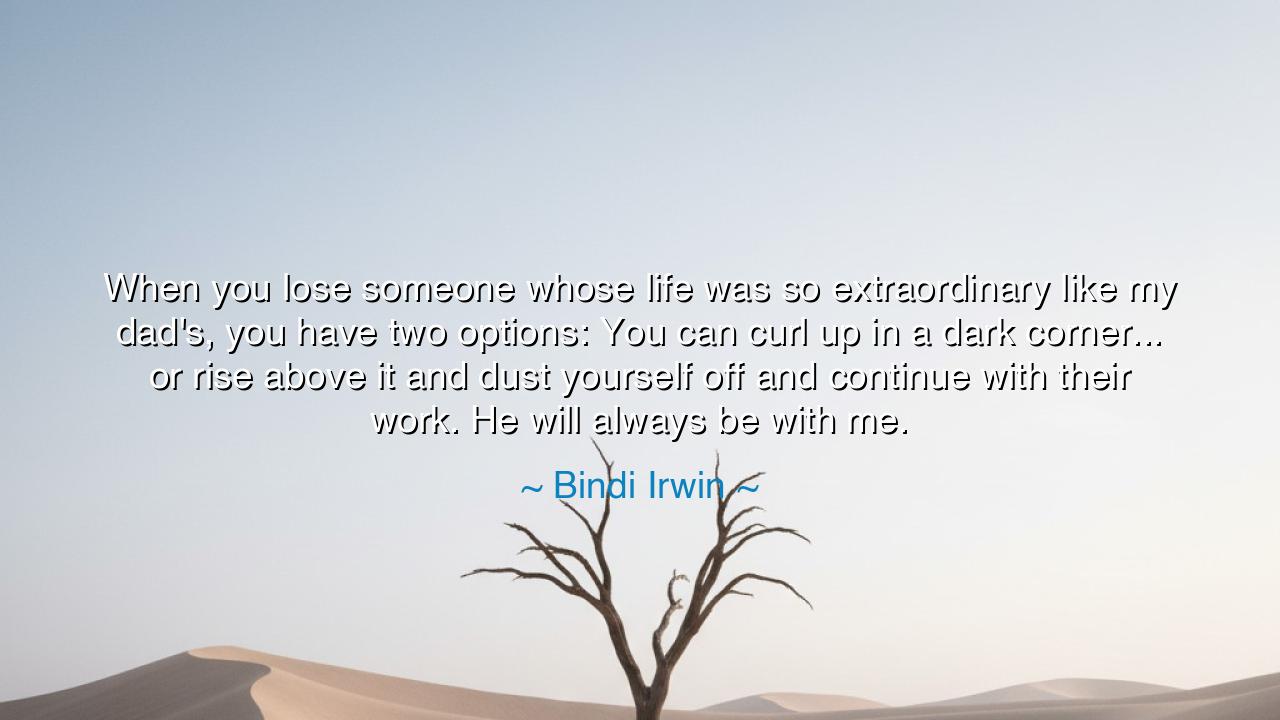
When you lose someone whose life was so extraordinary like my
When you lose someone whose life was so extraordinary like my dad's, you have two options: You can curl up in a dark corner... or rise above it and dust yourself off and continue with their work. He will always be with me.






“When you lose someone whose life was so extraordinary like my dad’s, you have two options: You can curl up in a dark corner... or rise above it and dust yourself off and continue with their work. He will always be with me.” Thus spoke Bindi Irwin, daughter of the fearless Steve Irwin, whose boundless spirit once roamed the wild plains and seas, defending the creatures of the earth. In her words shines not only the sorrow of loss but the fire of endurance — the sacred courage to turn grief into purpose. This quote is not merely about mourning; it is about transformation — the act of taking pain and forging from it something eternal, something that honors the one who has passed by living their vision anew.
When Steve Irwin, the Crocodile Hunter, died in 2006, the world mourned, but none so deeply as his daughter, then just a child. To Bindi, her father was not only a parent but a hero, a teacher of courage, compassion, and devotion to the living world. In the years that followed his death, the weight of his legacy might have crushed a lesser spirit. Yet Bindi, guided by her mother’s strength and her father’s memory, chose not to retreat into despair. She rose, as she says, to continue his work, carrying his torch into a new generation. This act of rising is the essence of her quote — the turning point between despair and destiny.
To “curl up in a dark corner” is the instinct of grief — the natural response of a wounded heart seeking shelter from the pain. Every soul who has known love will one day know this darkness. But Bindi reminds us that even within the depths of sorrow, there lies a choice — a quiet but mighty decision to either be consumed by loss or to rise above it, to honor the departed not by silence, but by action. To “dust yourself off” is not to forget or to harden, but to live again — to stand upon the foundation of what love has built and to carry its light forward.
Her father’s life, full of adventure and compassion, was not a life meant to end quietly. It was a call to action, an invitation to care for the world with equal passion. And so, Bindi’s vow that “He will always be with me” transcends sentiment. It is the ancient understanding that love, once truly given, does not die — it changes form. It becomes a force that guides from within. The body perishes, but the spirit endures in those who continue the work of love. In this, she mirrors the truth spoken by generations before her: that to honor the dead is not merely to remember them, but to embody them.
History, too, bears witness to this sacred inheritance. Consider Alexander the Great, who, upon the death of his teacher Aristotle, did not let grief diminish him but carried his mentor’s philosophy into the world through conquest and culture. Or think of Helen Keller, who lost both sight and hearing, yet carried forward the faith and dedication of her beloved teacher, Anne Sullivan. Like Bindi, they turned mourning into momentum. The greatness of those they lost became the seed of their own becoming. The flame of one life kindled the torch of another.
In Bindi’s words we also hear the echo of resilience — the idea that loss need not diminish the living, but can refine them. The pain of grief, like fire to metal, burns away weakness and reveals the core of who we are. Her choice to “continue with their work” is the act of rising from ashes with renewed purpose. She understood, even at a young age, what many never learn — that when those we love fall, the duty of carrying forward their vision passes to us. We become their living continuation, their hands and hearts still moving in the world.
And so, my children, take this lesson deep into your hearts: when you lose one whose light guided your path, do not let the world grow dim. Mourn, yes — for grief is sacred — but do not let mourning become your prison. Rise. Continue the work that they began, however small or mighty it may be. If they taught you kindness, be kind; if they taught you courage, be brave; if they taught you love, spread it to others. For in doing so, you do not leave them behind — you carry them forward.
Thus, through Bindi Irwin’s words, we learn the eternal truth that love never dies when it is lived through action. Every time she steps into the wild, every time she speaks of conservation, her father’s voice lives again — not as a memory, but as a living presence. This is the highest way to honor the dead: not through tears alone, but through the continuation of their spirit. So when grief comes to you, remember this: you have two choices — to wither in darkness, or to rise as the dawn. Choose, as Bindi did, to rise. For in rising, you become the proof that love is stronger than death, and that those we have lost are never truly gone — they are simply living through us.






AAdministratorAdministrator
Welcome, honored guests. Please leave a comment, we will respond soon